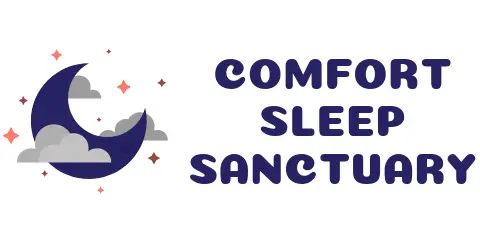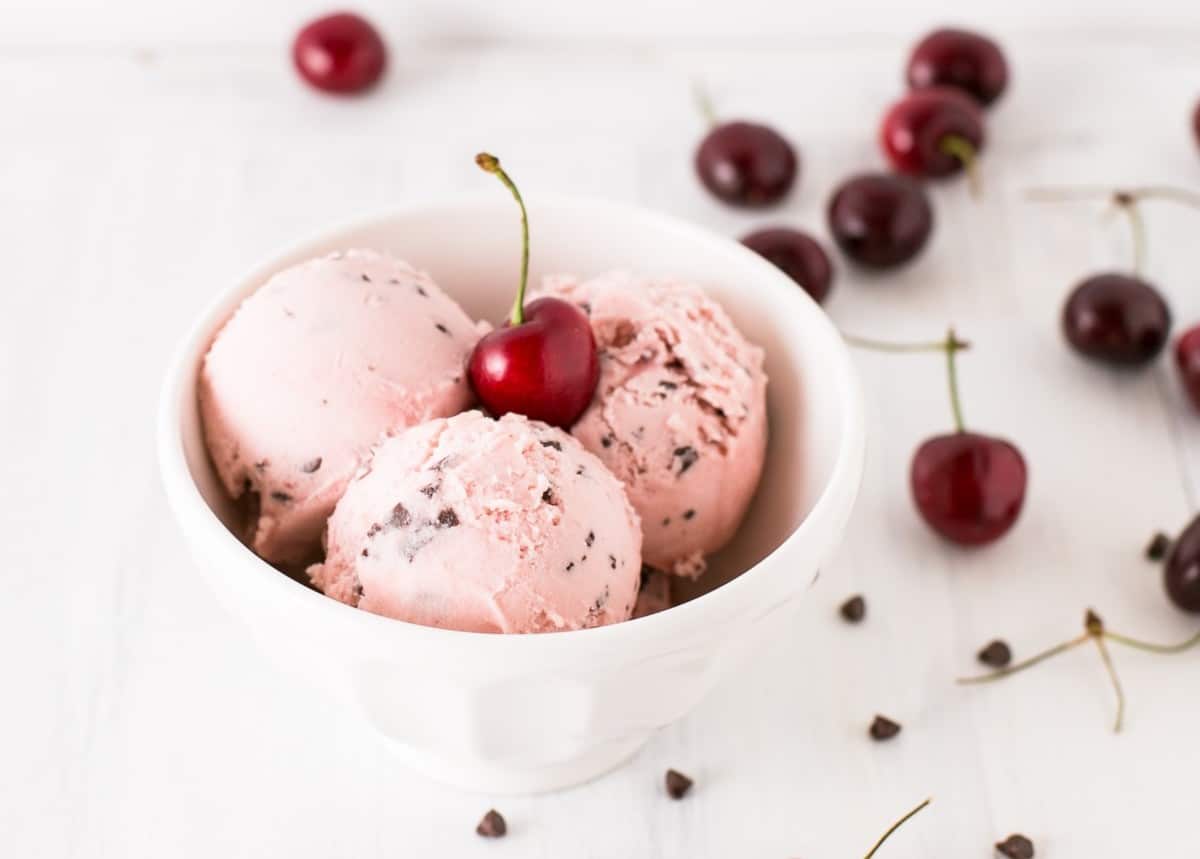Table of Contents
**This page contains affiliate links and I will be compensated if you make a purchase after clicking on my links**
Photo by Kim Daniels on Unsplash
An evidence-based review of sleepy foods
Here’s a quick quiz. Which of the following bedtime snacks will help your sleep? Choose only one.
- Warm milk
- Tart cherry juice
- Dark chocolate
All three have been touted by the internet (or your grandmother) to help you get to sleep. But only one has data to support that claim.
Did you choose tart cherry juice?
Read on…
To start, you shouldn’t eat a big meal right before bed. Instead, give yourself a good 2-3 hours.
Yes, your digestive system still works while you sleep, but it’s trying to rest, just like the rest of you.
Likewise, if you are susceptible to gastroesophageal reflux (GERD) then lying down with a full stomach is not recommended. Being horizontal makes it easier for stomach acid to come back up the esophagus, leading to heartburn and other problems.
Digestion issues aside, food intake in the evening (including snacking) may lead to poorer sleep quality, especially in women.
But if your stomach is growling that won’t help you fall asleep either.
Consider a light snack.
What is the best thing to eat?
Do carbohydrates before bed help sleep?
In a 2007 study by Afaghi, et. al. sleep quality was measured in twelve men eating high- or low- glycemic meals four hours prior to bedtime.
Glycemic index is a measurement of how quickly carbohydrate-rich food breaks down and hits your bloodstream as individual sugars (like glucose). This hit to your bloodstream raises insulin levels.
This obviously isn’t good if you are diabetic or pre-diabetic. Or at risk for heart disease. Or trying to lose weight.
In contrast, low-glycemic food may be either low in carbohydrates, to begin with, or any carbs break down slowly, keeping your insulin levels low.
In the study above, subjects were given either Mahatma or Jasmine rice to eat. Evidently Mahatma rice has a low glycemic index, while Jasmine rice has a high glycemic index.
- The high-glycemic meals led to shorter sleep onset latency, or the time it takes to fall asleep. (No effect on other sleep characteristics was observed.)
Why do high-glycemic foods induce sleep? The hypothesis is that the burst of insulin may raise the level of available tryptophan in the blood.
Interestingly, it’s not the total amount of tryptophan that is important, but the ratio of tryptophan to other amino acids (called Large Neutral Amino Acids, or LNAAs). All are competing to get into the brain.
Once in the brain, tryptophan is converted into serotonin (5-HT), a neurotransmitter. Serotonin has many functions, but one is to make you sleepy.
This mechanism is a bit counterintuitive, because amino acids, such as tryptophan, come from protein. Yet eating carbohydrates, not protein, leads to more available tryptophan.
In a large 2011 study by Diethelm, et. al., 594 toddlers, age 1.5 – 2 years, were followed.
- Those toddlers consuming a higher glycemic evening meal slept longer
The data on glycemic food is not consistent. In a 2011 study by Jailiolghadr, et. al. eight children were given a glass of milk an hour before bed. The milk had either a low- or high-glycemic index due to the addition of either honey or glucose, respectively.
- The high-glycemic drinks were worse on sleep compared to the low-glycemic drinks, increasing arousal, or wakefulness
The reason for this inconsistency is unknown, however, the authors suggest that meal timing may be important. If you are going to snack on high-glycemic foods, then snack more than an hour before bed.
Clearly more studies are needed.
In the meantime, I will continue my surgery dessert with dinner.
(That’s my excuse, and I’m sticking to it.)
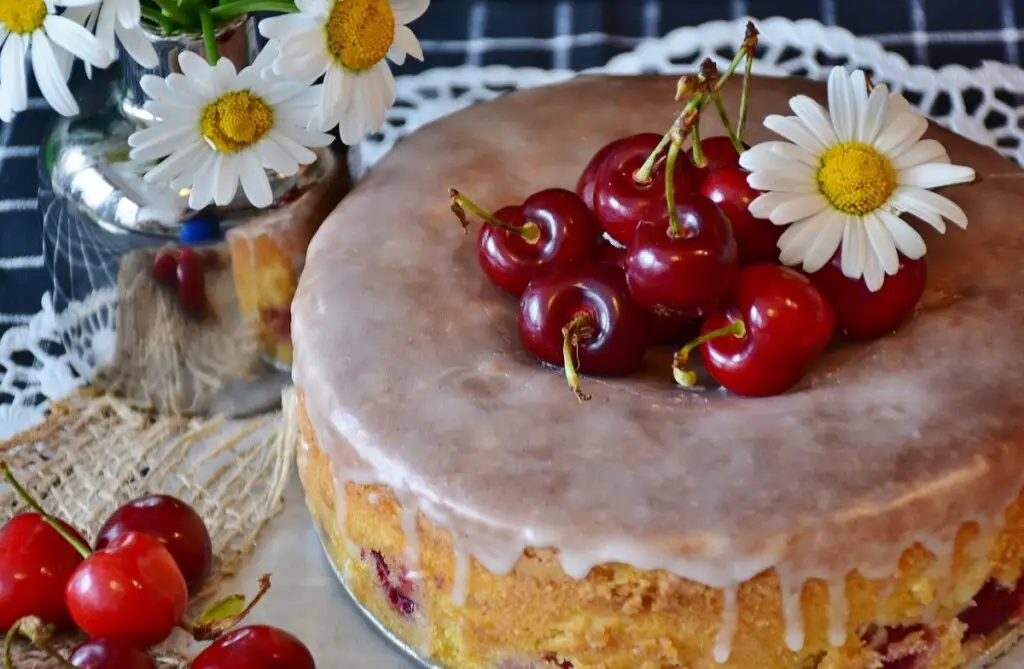
Foods that may help sleep
In addition to high-glycemic meals, specific foods have been associated with sleep benefits.
Cherries
Cherries are rich in polyphenols and vitamin C and have been studied for their antioxidant and anti-inflammatory properties. Indeed, some studies suggest that eating cherries may reduce your risk of chronic inflammatory diseases, such as arthritis, heart disease, diabetes, and even cancer.
Cherries fall into two different types, either “sweet” (Prunus avium), or “tart” (Prunus cerasus).
Of the hundred or so varieties, the most popular sweet cherry is Bing, and the most popular tart cherry is Montmorency.
If you happen to be traveling through Spain, then stop by the Jerte Valley for some Picota cherries, a sweet variety unique to the region.
The raw cherries you find in the produce section of your grocery store are most likely sweet cherries, such as Bing (or Picota). Tart cherries are usually found in processed form, such as juice, powder, or nutritional supplements.
One of the many nutrients in cherries is melatonin, a hormone you make to maintain your sleep-wake 24-hour cycle (circadian rhythm). Melatonin is high during darkness when it’s time to sleep and suppressed by exposure to light during the day.
Melatonin is present in both sweet and tart cherries.
In a 2012 study by Howatson, et. al., twenty volunteers drank tart cherry (Montmorency) juice for a week.
- The tart cherry juice significantly increased melatonin levels, total sleep time, and sleep efficiency
Sleep efficiency is the percentage of time spent in bed that you actually sleep.
In a 2010 study by Pigeon, et. al., fifteen adults with insomnia drank tart cherry (Montmorency) juice for two weeks. (During a different two weeks they drank dark cherry-flavored Kool-Aid as a control.)
- The tart cherry juice significantly improved sleep continuity
The Insomnia Severity Index and Waking After Sleep Onset were both improved.
However, other measurements, such as sleep latency, total sleep time, and sleep efficiency saw little improvement.
Tart cherries have more polyphenols than sweet cherries. These polyphenols may be responsible for the antioxidant and anti-inflammatory benefits.
As such, most studies have focused on tart cherries exclusively. Tart cherries get more attention, but sweet cherries may have many of the same benefits, including sleep.
In particular, cherries from the Jerte Valley have been found to be high in melatonin, serotonin, and tryptophan.
In a 2009 study by Garrido, et. al. 18 volunteers consumed a supplement made from Jerte Valley cherries.
- The Jerte Valley cherry supplement improved sleep time and immobility
In a 2013 follow-up, Garrido, et. al. studied thirty volunteers who drank a “Jerte Valley cherry-based product”
- The Jerte Valley juice improved sleep, as measured by sleep efficiency, number of awakenings, total nocturnal activity, sleep latency, assumed sleep, actual sleep time, and immobility
Both Montmorency and Picota cherries from the Jerte Valley have been shown to benefit sleep.
Popular Bing cherries may have similar benefits; however, evidence is lacking.
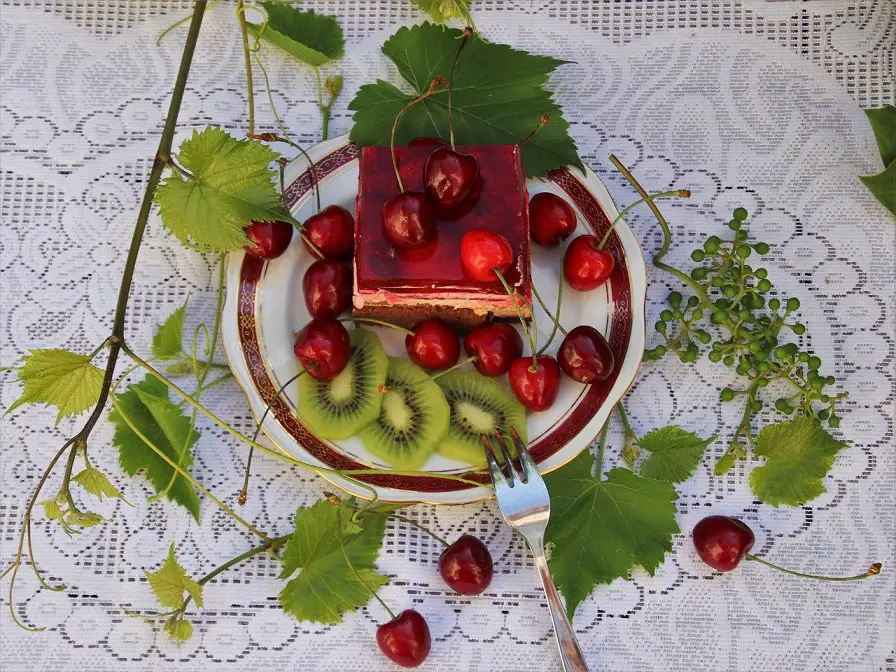
Image by pasja1000 from Pixabay
Kiwifruit
Kiwifruit (Actinidia) is a berry native to China. Kiwi contains a high level of several vitamins, especially vitamin C, as well as serotonin.
In a 2011 study by Lin, et. al., for four weeks, 24 people with sleep disorders ate two kiwifruits one hour before bedtime
- Sleep Quality Index, waking time after sleep onset, sleep onset latency, total sleep time, and sleep efficiency were all significantly improved
Unlike the studies above, where subjects were sometimes given cherry Kool-Aid instead of real juice, in this study there was no control group.
Therefore, the placebo effect may be in force. If these insomniacs thought that eating something would improve their sleep, then that something improved their sleep.
In addition to serotonin, the authors note that kiwi also contains folate. Folate deficiency has been associated with insomnia, so fixing that may lead to better sleep in those with sleep issues.
Kiwi is also rich in antioxidants, which may also lead to better sleep. But more study is needed.
Regardless of its possible benefit on sleep, kiwifruit is good for you.
Herbal tea with chamomile and valerian
Instead of snacking before bed, and risking possible indigestion, consider a soothing cup of tea.
Not regular tea mind you—that has caffeine—but herbal tea.
Two ingredients that have been shown to benefit sleep are chamomile and valerian.
Chamomile is related to the daisy; the flowers are dried and used either as a supplement or in teas.
In a 2017 study by Adib-Hajbaghery, et. al., 60 elderly people ingested capsules of chamomile twice daily for 28 days.
- Compared to the control, sleep quality improved with the ingestion of chamomile
How does chamomile work? Chamomile contains many flavonoids, including one called apigenin. Apigenin binds benzodiazepine receptors in the brain.
Benzodiazepines are drugs prescribed for anxiety, including Valium® and Xanax®. Side effects include drowsiness.
These drugs—and presumably apigenin—mimic the neurotransmitter GABAA by binding and activating its receptor in the brain.
In other words, chamomile may be a mild form of an anti-anxiety drug.
Valerian comes from the roots and stems of the herb, Valeriana officinalis, and is also used either as a supplement or in teas.
In a 2011 study by Simin, et. al., 100 postmenopausal women with insomnia were given either concentrated valerian extract or a control twice per day for 4 weeks.
- Compared to the control, there was a significant improvement in sleep quality with valerian
Like chamomile, valerian is thought to work via the GABA pathway.
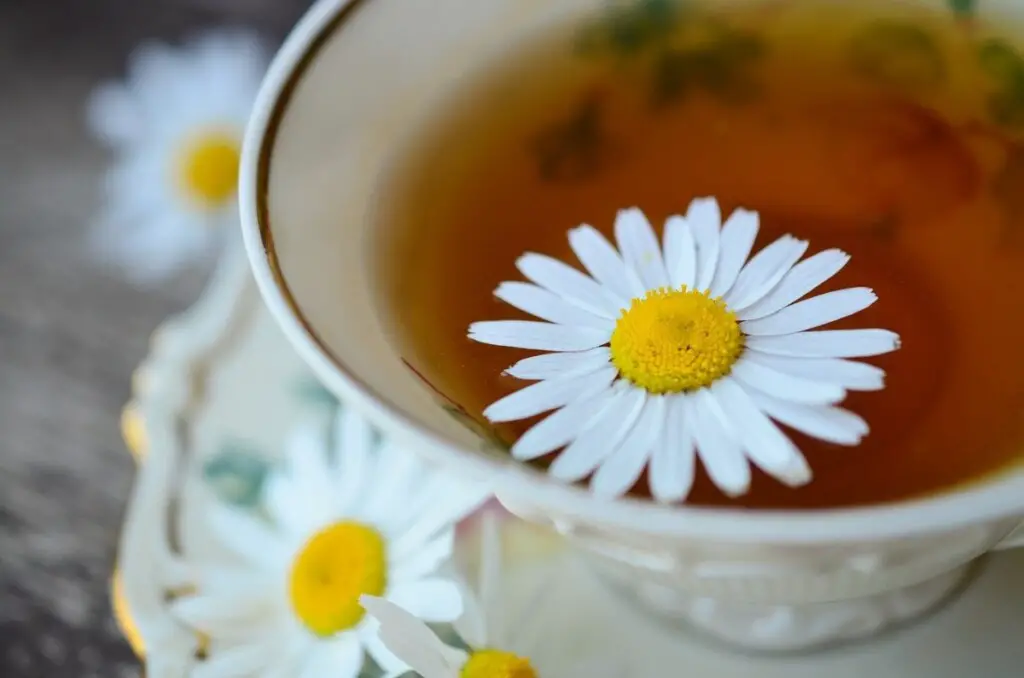
Image by congerdesign from Pixabay
Other foods that may help sleep, but direct evidence is lacking
Foods rich in melatonin and tryptophan
All plant-based foods contain some melatonin, although amounts vary. Foods rich in melatonin include tomatoes, olives, barley, rice, and walnuts. This list includes grapes, so even your glass of wine may have some melatonin.
Like humans, other animals also make melatonin. Melatonin is found in meat, especially eggs and fish.
However, just because you eat food high in melatonin, doesn’t necessarily mean you sleep better.
Likewise, many foods are high in tryptophan—turkey is an often-cited example. But all protein-based food, including meat, milk, cheese, and eggs, are high in amino acids, including tryptophan.
Turkey doesn’t have any more tryptophan than say, hamburger meat.
Again, it’s not the amount of tryptophan, but instead the ratio of tryptophan to other amino acids, that determines how much gets into your brain. And this ratio is controlled by insulin, which is controlled by sugar.
Yes, we all pass out after a Thanksgiving dinner. But that may be more due to high-glycemic foods such as mashed potatoes.
However, having more tryptophan in your diet has been associated with better sleep.
Carnivores get plenty of tryptophan. You vegetarians out there need to make sure you eat enough grains and nuts.
Indeed, different kinds of nuts are often considered good bedtime snacks. Nuts are high in protein and are therefore rich in tryptophan, plus other nutrients.
Foods rich in magnesium
Another nutrient associated with sleep is magnesium. Magnesium supplements have increased sleep time and decreased sleep latency in elderly subjects.
However, the elderly tend to be deficient in many nutrients, including magnesium. It’s not known if additional magnesium has any benefit in those of us who aren’t deficient.
Again, many foods rich in magnesium are touted as having benefits on sleep. However, data on sleep is mostly lacking. But they certainly can’t hurt…
Listed, in order, are foods with the highest magnesium content:
- Pumpkin seeds
- Almonds
- Spinach
- Cashews
- Peanuts
- Cereal, shredded wheat
- Soymilk
- Black beans
- Edamame
- Dark chocolate
Pumpkin seeds
Pumpkin seeds are at the top of the list for magnesium. In addition, they are also rich in tryptophan and are included in many internet lists of “sleepy foods”.
In a 2005 study by Hudson, et. al., 49 insomniacs were given one of three different supplements:
- “Deoiled gourd seed” plus carbohydrates
- Pharmaceutical-grade tryptophan plus carbohydrates
- Carbohydrates alone as a control.
(Recall from above, that tryptophan doesn’t get into the brain without the help of carbs.)
- The “natural” tryptophan from the gourd seeds worked as well as the pharmaceutical-grade tryptophan and significantly improved insomnia, compared to carbohydrates alone
“Deoiled gourd seed” are not from pumpkin, but a different gourd (Lagenaria siceraria) that is very high in tryptophan.
At 30% protein, pumpkin seeds also contain significant tryptophan, although not as much.
So, although there isn’t any direct evidence, it’s likely that pumpkin seeds may help with sleep.
But if not, they’re an excellent nutritional snack.
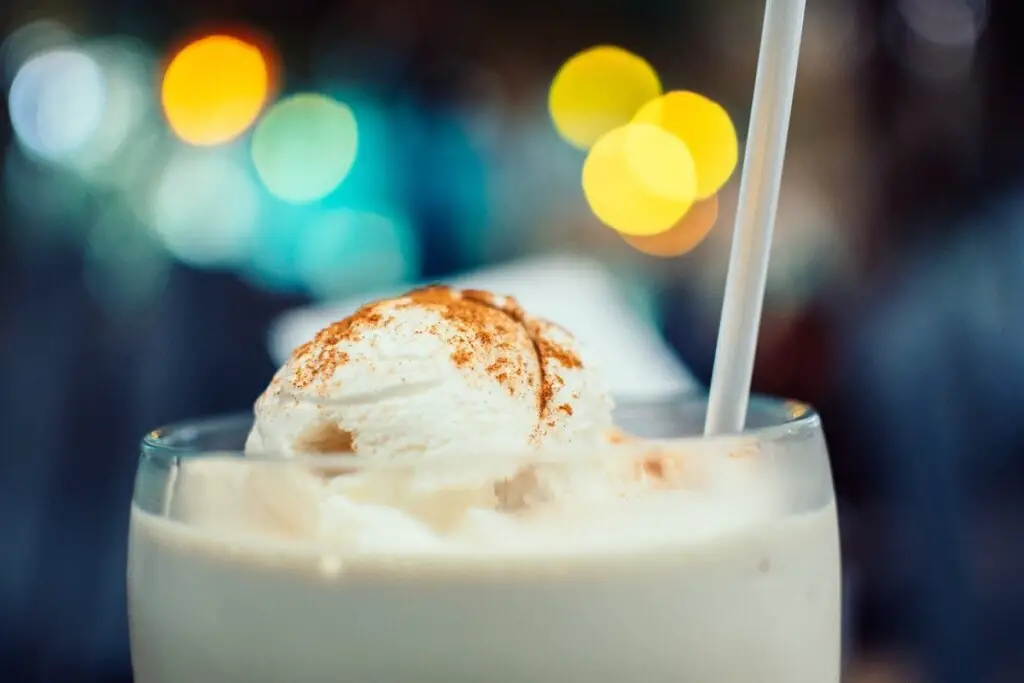
Image by Daniel Mena from Pixabay
What happened to warm milk?
Yes, several studies have been conducted on special milk. One is malted milk, specifically the brand Horlicks. (Based on limited data) this milk supplement has been found to improve sleep, especially in older individuals.
It’s not known how it works; however, Horlicks is rich in vitamins D, B-6, and B-12, which may play a role in sleep. Those who are deficient in these vitamins—especially the elderly—would be more likely to benefit.
Another type of milk is “night milk”, which is milked from cows at night. As a result, this milk is high in both tryptophan and melatonin. One study demonstrated an increase in morning and evening activity in elderly patients, but otherwise, it’s not known if melatonin-enriched milk helps sleep.
But what about regular milk? It is rich in magnesium and tryptophan after all. Unfortunately, there are no data.
But we know that “bedtime routines” are important to getting a good night’s rest. Take a warm bath, put on your PJs, brush your teeth, and listen to a story… (That last bit works for both children and adults.)
For many of us, that glass of warm milk may be part of our routine, signaling our body that it’s time to rest. The same applies to any snack foods you habitually eat right before bed.
What NOT to eat before bed
As mentioned above, avoid a big heavy meal before bed.
Avoid alcohol
Yes, alcohol has a sedating effect. But once you fall asleep your sleep quality is poor.
Specifically, your REM, or dreaming, sleep, is suppressed.
In addition, during the second half of the night, you are more likely to wake up or spend more time in light sleep, rather than restorative deep or REM sleep.
But what about a single glass of melatonin-enriched red wine?
Obviously, the more alcohol you drink the more pronounced the effect.
In a small 2006 study by Feige, et. al., healthy subjects drank enough to raise their blood alcohol to either 0.03% or 0.1% before bedtime.
To put this into context, 0.1% will get you arrested for drunk driving, while 0.03% may be equivalent to a single drink for a lightweight person.
At 0.1% all kinds of sleep changes could be measured, including reduced REM during the first half of the night, and lighter sleep during the latter half.
- However, with 0.03% blood alcohol no clear effects on sleep could be detected
Just because sleep effects couldn’t be detected doesn’t mean they weren’t there.
But one glass of red wine is probably fine. (Or two if you’re a large person.)
Just stop there.
Avoid caffeine
Coffee, tea, and most soft drinks (eg, Coca-Cola®) contain caffeine. Plus, most everything marketed as an “energy” drink or “energy” bar.
Caffeine works by blocking our adenosine receptors. Adenosine promotes sleep and affects memory and learning. Indeed, blocking adenosine with caffeine, not only wakes us up, but improves our cognitive function, or our ability to think.
Good stuff.
Like most drugs, the more you drink, the more tolerance you develop, and the more you need to wake you up.
Plus, there are the usual genetic differences between us. Some of us are naturally more sensitive to caffeine than others.
Therefore, some of us are good with one cup of coffee in the morning to get us going; while others drink it all day.
If you fall into the latter camp, you may wish to pick a time during the day to switch to decaf. My cut-off time is noon, but you may be able to go later in the day.
The key is to make sure your system is caffeine-free prior to going to bed.
Some foods also contain caffeine. Chocolate (unfortunately) is one of those, albeit with a much smaller amount than coffee.
I find it humorous that the internet lists dark chocolate as a sleep-inducing food, probably due to its high level of magnesium.
Will the magnesium counteract the caffeine? I doubt it.
Yes, I know I should switch my chocolatey-rich evening dessert to dark cherry. But perhaps, I’ll alternate…
Want to learn more about the products mentioned?
[If you experience issues with menus or links not working, it is most likely due to your Ad blocker.]
